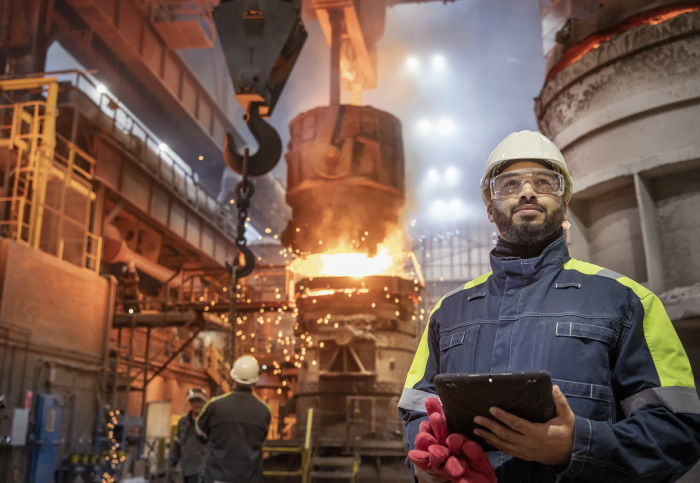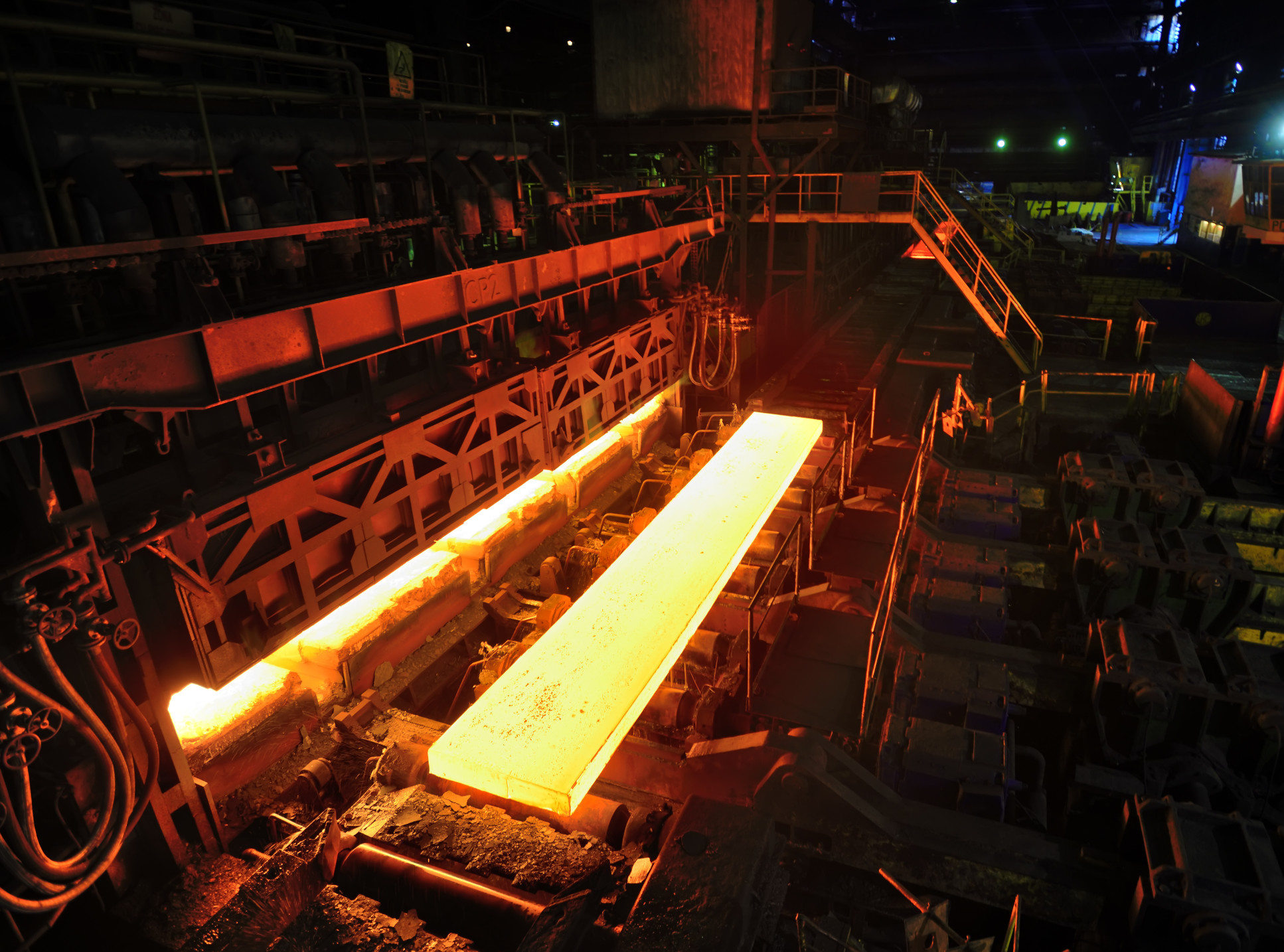Patterns in big data hold the key to more efficient, greener steel production
by Ian Mundell

Deep.Meta, a startup with its roots at Imperial, is leading a £1.9m project to explore ways to optimise steel production using AI.
Steel companies collect lots of information about their production processes, yet they don’t always get the most out of this data. This where Deep.Meta comes in. Set up by Imperial alumnus Dr Osas Omoigiade, and nurtured in the College’s innovation ecosystem, the company is developing machine learning techniques that can make steel plants cleaner and more efficient.

“There is a huge opportunity to leverage the existing data that large steel plants are already generating, in order to make better decisions on their production lines and achieve goals such as lowering material waste and energy usage, which will lead to lower carbon emissions,” says Dr Omoigiade, who is the Founder and chief executive of Deep.Meta.
In October, a consortium led by Deep.Meta was awarded an Innovate UK grant for a £1.9 million project to further explore these potential benefits and ways of passing them on to steel users in the construction sector. Other participants in the project include the Materials Processing Institute, steel re-roller Spartan UK, and real estate company Grosvenor.
Nurtured in The Greenhouse
Dr Omoigiade studied materials science at Imperial as an undergraduate, before going to the University of Cambridge for his master’s degree. He returned to Imperial’s Department of Materials to complete an industry-sponsored PhD in steel metallurgy, focusing on wire production. He then went to work in the private sector, before deciding to set up his own company in 2020. “Deep.Meta brings together all of my work experiences in sustainability and manufacturing, as well as my PhD in steel metallurgy,” he says.
Early on in its journey, Deep.Meta participated in Imperial’s Venture Catalyst Challenge (VCC), an entrepreneurial competition for Imperial students, alumni and early career researchers. This provides practical help with business development, and inspiration from mentors and fellow entrepreneurs culminating in a pitch competition. “At the end of that process we were delighted to find out that Deep.Meta was the winner for the energy and environment track,” Dr Omoigiade recalls.
The Greenhouse has made a material difference to our journey as a company. Dr Osas Omoigiade Deep.Meta
Along the way, one of the company’s mentors suggested that the company would be a good fit for The Greenhouse, an accelerator programme for climate-related startups run by Imperial's Centre for Climate Change Innovation and hosted at the Royal Institution. Dr Omoigiade applied, and Deep.Meta was accepted into the accelerator’s second cohort.
The company went on to win the demo day that concluded the programme in June, where it was recognised as being among the projects with the highest commercial potential and climate impact in its cohort.
“During our time in The Greenhouse we completed our first priced round, raising around £500,000 from a group of angels and venture capitalists,” Dr Omoigiade says. “One of those investors was introduced to directly through our connection with The Greenhouse, so it has made a material difference to our journey as a company.”
Working with big data
At the same time, Deep.Meta was talking with players in the steel industry, such as the Materials Processing Institute, to pin down digital approaches they could work on together, to help the sector optimise its production processes.
One area is troubleshooting, which is typically handled by trial and error. Engineers try one solution, then another, until they find the source of the problem. In the meantime, where processes continue to run, material and energy waste can accumulate. Yet pointers to the best solution may already be present in the process data routinely collected in the plant, if only the engineers could see it.
We use AI to look for patterns in information that humans would not otherwise be able to recognise. Dr Osas Omoigiade Deep.Meta
“Humans are good at pattern recognition when it comes to small amounts of information, but become less effective at doing so when faced with huge amounts of information. We are designed for creative thinking, not computation,” Dr Omoigiade explains. “By using AI, we can look for patterns in this information that humans would not otherwise be able to recognise.”
AI can also help with operational activity. One of Deep.Meta’s partners, the Gateshead steel re-roller Spartan UK, heats up slabs of steel in a furnace, before rolling them into steel sheets and other products. These slabs come in different shapes and sizes, so Deep.Meta is working with the company on an algorithm that will tell engineers the most efficient order in which to feed successive steel slabs into the furnace. “When you reduce each heating cycle by one hour over the course of the day, this can add up to significant savings in energy over time and materially impact the bottom line.”
Completing the chain
The Innovate UK project will consider solutions such as these for steel producers, and how the benefits can be passed on to steel end-users. These are represented in the consortium by real estate company Grosvenor, which is keen to reduce the carbon footprint of its buildings. Around 20% of the emissions embodied in the kind of large buildings it builds and owns are to be found in the steel frames that hold the buildings up.
Zero-carbon steel is not yet being produced on a large enough scale to make its use economically viable for companies such as Grosvenor, so approaches that reduce the carbon footprint of existing production methods are highly attractive. “With Deep.Meta, we are not materially changing the processes, but optimising what is currently used to make steel at scale. That means we can reduce carbon emissions at a lower cost,” says Dr Omoigiade.

Deep.Meta’s introduction to Grosvenor also comes though Imperial. The company provided prize money for the VCC competition, which was the beginning of a conversation about on how Deep.Meta could help it lower the carbon footprint of its buildings.
Beyond AI, Dr Omoigiade sees potential for applying other digital technologies to the steel industry, such as using distributed legers constructed with blockchain to track steel throughout its life cycle.
We want to provide the missing information so that governments and construction firms can make better informed decisions about reusing steel. Dr Osas Omoigiade Deep.Meta
“If you are going to demolish a tall building and recover the steel from the frame, it is currently difficult to say whether or not that steel can be reused. There is no record of the fatigue cycles it has been through, or the stresses it has been subjected to, so that we can tell how much life is left in it,” Dr Omoigiade explains. “What we want to do is provide that missing information so that governments and construction firms can make better informed decisions about reusing steel.”
With the right information, for example, it may be possible to use such steel directly after recovering it from an old building, rather than having to ship to a distant furnace to be melted down and reshaped into fresh girders. “If we can cut out all of that and simply take the steel to the next construction site, it transforms the economics.”
Industry pictures: Getty Images
Article text (excluding photos or graphics) © Imperial College London.
Photos and graphics subject to third party copyright used with permission or © Imperial College London.
Reporter
Ian Mundell
Enterprise